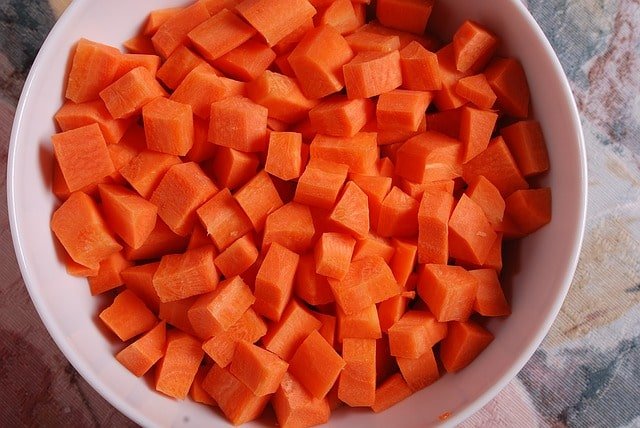What is a Carrot (Gajar)?
Carrots (Gajars) are defined technically as Daucus carota and are considered as root vegetables. This carrot is generally orange in appearance, but it can also be purple, black, red, white, or yellow.
The taproot is perhaps the greatest often consumed portion of the vegetable, although the green portion is sometimes consumed as well. Carrots are most often consumed in their domesticated form, which is native to Europe as well as southwestern Asia.
China is the largest producer of carrots in the world, followed by Uzbekistan, the USA, and Russia.
Carrots provide a plethora of health advantages due to their high nutritional content.
People who eat carrots have less cholesterol, a lower probability of heart problems, less cancer risk, better eyesight, and fewer signs of early aging.
Carrots may also enhance your skin, immune response, digestion, & cardiovascular health, detoxify your body, as well as improve your dental health.
What is the Nutritional Value (Facts) of Carrots (or Gajar)?
Carrots are mostly constituted of water and carbs, which include starch and sugars such as sucrose as well as glucose.
These have nutritional advantages due to the beta-carotene and fiber they contain.
Additionally, carrots are high in Vitamin A, Vitamin C, Vitamin K, folate, pantothenic acid, vitamin B8, iron, potassium, copper, and manganese. Finally, they are high in antioxidants.
The nutrition value (facts) of carrots is as under:
| Nutritional Value (Facts) per 100 gram serving of Carrot (Gajar), raw (1) | |
| Energy | 41 Kcal |
| Water | 88.3 g |
| Carbohydrates | 9.58 g |
| Sugars | 4.74 g |
| Dietary fiber | 2.8 g |
| Protein | 0.93 g |
| Fat | 0.24 g |
| Minerals | |
| Sodium | 69 mg |
| Calcium | 33 mg |
| Potassium | 320 mg |
| Copper | 0.045 mg |
| Iron | 0.3 mg |
| Magnesium | 12 mg |
| Phosphorus | 35 mg |
| Zinc | 0.24 mg |
| Manganese | 0.143 mg |
| Vitamins | |
| Vitamin A, RAE | 835 mcg |
| Vitamin B1 (Thiamine) | 0.066 mg |
| Vitamin B2 (Riboflavin) | 0.058 mg |
| Vitamin B3 (Niacin) | 0.983 mg |
| Vitamin B5 (Pantothenic acid) | 0.273 mg |
| Folate | 19 mcg |
| Vitamin C | 5.9 mg |
| Vitamin E | 0.66 mg |
| Vitamin K | 13.2 mcg |
What are the Uses And Health Benefits of Carrots (Gajar)?
Carrots come in a variety of forms; including oil, powder, as well as juice. Carrots are beneficial for digestion, vision, digestive issues, and diabetes. You can also incorporate this miraculous vegetable into your weight-loss regimen.
Additionally, I will also explain the carrot’s negative effects and allergic reactions, as well as its dosage in this article.
13 Main Uses and Health Benefits of Carrots are:
1) Carrots May Reduce the Risk of Cancer
Various cancers are combated by the beta-carotenoids found in carrots. If you’re a smoker, you are three times more likely to get lung cancer if you don’t eat carrots.
It is possible to utilize carrot juice extract to destroy leukemia cells as well as prevent their growth (2).
Diets rich in beta-carotene also help protect against prostate cancer (3).
Additionally, beta-carotene consumption may help reduce the risk of developing colon cancer (4).
2) Benefits of Carrots for Eye Health
In the recommended amount, Vitamin A is necessary for good vision, and carrots are rich in this vitamin. But when you don’t get enough vitamin A, the outer parts of your eye’s photoreceptors start to deteriorate, which can lead to night blindness (5).
Carrots being rich in beta carotene help to compensate for Vitamin A deficiency.
However, studies have indicated that individuals are unlikely to notice improvements in their eyesight unless they already have a Vitamin A deficit.
Normal chemical processes involved in vision can be disturbed by the deficiency of vitamin A. Consuming a sufficient amount of vitamin A can facilitate vision health (6).
3) Carrots May Prevent Macular Degeneration
Macular degeneration is a prevalent condition that mostly affects the elderly and diminishes the macula’s function.
Individuals who consume more beta-carotene, which is present in carrots, have a considerably decreased risk of age-related macular degeneration than those who consume less (7, 8).
4) Benefits of Carrots in Diabetes Control
Consuming beta-carotene may help those who are predisposed to Type-2 diabetes and lessen their chance of acquiring the disease. To reduce the risk of type 2 diabetes you should maintain a healthy lifestyle, and follow a balanced diet.
Carrots are rich in carotenoids, which have been shown to have an anti-insulin resistance effect.
Some studies have found low blood levels of vitamin A in people with diabetes. The anomalies in the metabolism of glucose would need an increased requirement of antioxidants to fight oxidative stress; and vitamin A, being a strong antioxidant, may help here (9).
Carrots have a low glycemic index score, which means that they are unlikely to trigger a spike in levels of blood sugar. The GI index is very helpful for diabetic patients to understand which food can possibly raise their blood sugar levels.
Also, consuming high-fiber foods like carrots may also help to prevent the development of type 2 diabetes (10).
5) Benefits of Carrots in Digestive Disorders
An average medium carrot has 1.7 grams of fiber (1), i.e. approximately 5–7.6% of an individual’s daily need (11), according to their age and sex. Meanwhile, 100 grams of raw carrots provide you with 2.8 grams of fiber.
Carrots have an adequate quantity of nutritional fiber in their roots; hence their ingestion will undoubtedly benefit your digestive system. The stool’s motion becomes more fluid when fiber adds volume to it.
Additionally, fiber promotes peristaltic action and gastric juice release. This whole process assists in alleviating the severity of problems such as constipation as well as safeguards the stomach and colon against a variety of dangerous ailments such as colorectal cancer.
Consuming a sufficient amount of fiber can help in the ideal working of your entire digestive system. People who eat a high-fiber diet may have a lower risk of colorectal cancer than those who eat little fiber (12).
As a bonus benefit of eating carrots, you’ll see an improvement in your cardiovascular health thanks to the fiber they contain.
6) Carrots Strengthen the Immune System
Carrots are high in Vitamin C, which boosts white blood cell activity. WBCs are mostly important for defending your body against infectious illnesses and external things.
Also, vitamin C in carrots also helps in collagen production. This collagen is an important constituent of connective tissue and is necessary for the healing of wounds and keeping your body healthy (14).
Vitamin A also plays an important role in regulating the functioning of your immune system and helps to prevent infections (13). And you can get this immune-boosting vitamin in good quantities from carrots.
Additionally, carrots have a variety of antiseptic as well as antibacterial characteristics that aid in the strengthening of our immune system.
7) Carrots May Lower Blood Pressure
Carrots are high in potassium, which acts as a vasodilator. Lower blood pressure and more efficient circulation are two of the many benefits that come from potassium.
When you eat carrots, your organs work better and your cardiovascular system doesn’t have to work as hard. When your cardiovascular system is not stressed, the risk of developing health problems such as atherosclerosis, strokes, as well as heart attacks greatly decreases.
One study has revealed that drinking carrot juice may protect the cardiovascular system by increasing total antioxidant status and also decreasing systolic blood pressure. The nutrients present in its juice, like fiber, nitrates, vitamin C, and potassium, were found to support this effect (15).
8) Carrots Promote Cardiovascular Health
Carrots have been shown to help lower cholesterol concentrations in your blood. High cholesterol level is a crucial risk factor for the majority of heart illnesses.
Consumption of vegetables that are high in fiber, like carrots, may also decrease an individual’s risk of developing cardiovascular disease and lower levels of LDL cholesterol (16).
9) Benefits of Carrots For Oral Health
Being rich in antioxidants, carrots also boost the health of your gums and make you spit out more than usual. Saliva is naturally alkaline and protects your mouth from germs that cause cavities, halitosis, and other oral health concerns.
10) Benefits of Carrots For Skin Health
The nutrients present in carrots may be especially beneficial for your skin health.
Carrots have a good amount of carotenoids. A study suggests that fruits and vegetables that are rich in carotenoids can improve skin appearance and also help people appear relatively younger (17).
However consuming foods like carrots, which are high in carotenoids, can cause carotenemia (a condition characterized by yellow pigmentation of the skin and higher beta-carotene levels in the blood) (18).
Additionally, carrots are rich in vitamin C, a nutrient necessary for collagen production. This compound provides elasticity and strength to your skin (19). This vitamin also acts as an antioxidant to protect your skin from free radical damage (19).
11) Carrots May Improve Bone Health
Carrots are high in vitamin K as well as include minerals such as calcium and phosphorus. All of these factors promote bone health and may aid in the prevention of osteoporosis (20).
Vitamin A affects bone cell metabolism. And carotenoids are linked with better bone health (21). Thus, carrots being rich in Provitamin A carotenoids may promote bone health.
12) May Help In Weight Loss
Raw carrots consist of about 88.3% water. And 100 grams of carrot gives you 41 kcal of energy (1). So, including them in your diet can increase fullness without piling on calories.
Carrots are also rich in fiber and a study has found that meals with whole and blended carrots resulted in higher satiety levels (22).
Thus, carrots may be a beneficial addition to an effective weight-loss diet.
13) Carrots May Promote Liver Health
The carotenoids present in carrots are believed to promote liver health.
Several studies have pointed out that the antioxidant and anti-inflammatory effects of carotenoids protect against non-alcoholic fatty liver disease (NAFLD) (24, 25). NAFLD is a condition that occurs when fat accumulates on your liver and is mainly a result of excess weight or poor diet.
Also, Carrots contain glutathione which is an antioxidant that was found to have the ability to cure liver damage caused by oxidative stress (23).
How to Use and Eat Carrots (Gajar)?
These are delicious, versatile, and healthy vegetables. The spring and fall are the two seasons for carrots, but these are often accessible year-round in stores. They may be purchased raw, refrigerated, pickled, preserved, or in juice form.
They should be refrigerated inside a plastic bag that is sealed. Before storage, remove any greens from the crowns to stop them from sucking moisture as well as nutrients from their roots.
How to Eat Carrots?
Carrots are a vegetable that may be used in a variety of ways. They may be consumed fresh, steamed, cooked, roasted, or added to soups, stews, and fried rice.
Remember carrots should be washed and peeled properly before you consume them, after that:
- Carrots, shredded, may be used in coleslaws, salads, and wraps.
- Shredded carrots are an excellent addition to baked products such as cakes as well as muffins.
- Carrot sticks or tiny carrots may be served as a snack, perhaps with hummus or a yogurt-based dip.
- When you add carrots to liquid and smoothies, they add a naturally sweet and mild taste.
- Boiling veggies may significantly diminish or remove their nutritional value. Carrots are nutritionally dense either raw or steamed.
What is the Dosage of Carrots (Gajar)?
The following doses by mouth have been investigated by scientists:
Dosage in Adults
Consuming 100 grams of shredded carrots every day for sixty days was used to treat vitamin A deficiency.
Dosage in Children
A teaspoonful of carrot jam every day for ten weeks was used to treat vitamin A deficiency.
What are the Side Effects of Carrots (Gajar)?
These are very beneficial for health but have some side effects too. 5 Side effects of carrots are:
1) Carrots May Cause Allergies
Certain individuals are allergic to carrots. Frequent adverse effects include skin rashes, diarrhea, hives, swelling, and difficulty in breathing after consuming this vegetable. Sometimes, it may lead to an anaphylactic reaction (which is a severe allergic shock) (26).
According to one study, carrots can cause pollen-related allergies in over 25% of individuals with food allergies. This could be associated with their allergy to specific carrot proteins (27).
Allergy due to carrots is an example of cross-reactivity where the proteins in certain vegetables or fruits trigger an allergic reaction due to their resemblance to the proteins found in certain types of pollen.
Individuals with mugwort pollen or birch pollen allergy may also react to this vegetable. Carrot allergy may not tend to happen if you eat the carrots after cooking.
2) Carrots Can Cause Carotenemia
Because of their high beta carotene content, carrots are an excellent source of Vitamin A.
Consuming a large number of carrots can cause a harmless condition called carotenemia. This is a condition characterized by yellow pigmentation of the skin and higher beta-carotene levels in the blood (18).
3) Sugar Contents are High
Consuming carrots in large amounts should also be avoided by diabetic patients due to their high sugar content.
Steamed carrots are the greatest option for diabetics, but only in appropriate quantities.
4) It Can Change Breast Milk’s Flavor
When you are nursing, everything you eat or drink will pass through your milk to the child. Carrot juice has been shown to alter the taste of breast milk in trials.
5) It May Cause Flatulence
Due to the high fiber content in carrots, some individuals eating large amounts of this veggie may find it difficult to digest them and may experience flatulence, bloating, and other gastrointestinal problems.
Final Word
Carrots are rich in nutrients like minerals, vitamins, fiber, and plant compounds, and are low in calories. This veggie is very beneficial for eye and heart health, digestion, immune function, and helps in weight loss.
If you eat carrots in appropriate amounts, this tasty vegetable can be very healthy and nutritious for your body.
Frequently Asked Questions:
Can eating too many carrots give you diarrhea?
Yes, it can cause.
Because of the high fiber content of dietary fiber in this vegetable, if you consume too many carrots, the fiber in them will cause flatulence, bloating, diarrhea, and other gastrointestinal problems.
How many carrots should I eat per day?
One medium carrot (61 gram) contains about 509 micrograms (retinol activity equivalent or RAE) of vitamin A (1).
And you know that the tolerable upper limit of vitamin A (RAE) to prevent its toxicity is 3,000 micrograms per day.
So, this equates to about 5 to 6 medium (61 gram) carrots. You should not go beyond this amount.
Hence eating two or a maximum of three medium carrots per day can be recommended.
References:
1) U.S. DEPARTMENT OF AGRICULTURE, FoodData Central
https://fdc.nal.usda.gov/fdc-app.html#/food-details/170393/nutrients
2) Bioactive chemicals from carrot (Daucus carota) juice extracts for the treatment of leukemia
https://pubmed.ncbi.nlm.nih.gov/21864090/
3) Plasma and dietary carotenoids, and the risk of prostate cancer: a nested case-control study
https://pubmed.ncbi.nlm.nih.gov/14973107/
4) Carotenoids and colon cancer
https://pubmed.ncbi.nlm.nih.gov/10648274/
5) [Historical milestones in the treatment of night blindness]
https://pubmed.ncbi.nlm.nih.gov/6085992/
6) Nutrients for the aging eye
https://www.ncbi.nlm.nih.gov/pmc/articles/PMC3693724/
7) The relationship of dietary carotenoid and vitamin A, E, and C intake with age-related macular degeneration in a case-control study: AREDS Report No. 22
https://pubmed.ncbi.nlm.nih.gov/17846363/
8) Associations between intermediate age-related macular degeneration and lutein and zeaxanthin in the Carotenoids in Age-related Eye Disease Study (CAREDS): ancillary study of the Women’s Health Initiative
https://pubmed.ncbi.nlm.nih.gov/16908818/
9) Vitamins and type 2 diabetes mellitus
https://pubmed.ncbi.nlm.nih.gov/25388747/
10) Dietary Fiber Intake and Type 2 Diabetes Mellitus: An Umbrella Review of Meta-analyses
https://www.ncbi.nlm.nih.gov/pmc/articles/PMC5883628/
11) Dietary Guidelines for Americans, 2020-2025 and Online Materials
https://www.dietaryguidelines.gov/resources/2020-2025-dietary-guidelines-online-materials
12) Dietary fiber intake and risk of colorectal cancer and incident and recurrent adenoma in the Prostate, Lung, Colorectal, and Ovarian Cancer Screening Trial
https://www.ncbi.nlm.nih.gov/labs/pmc/articles/PMC4588743/
13) Role of Vitamin A in the Immune System
https://www.ncbi.nlm.nih.gov/labs/pmc/articles/PMC6162863/
14) Vitamin C and immune cell function in inflammation and cancer
https://www.ncbi.nlm.nih.gov/labs/pmc/articles/PMC6195639/
15) Drinking carrot juice increases total antioxidant status and decreases lipid peroxidation in adults
https://www.ncbi.nlm.nih.gov/labs/pmc/articles/PMC3192732/
16) Dietary Fiber Is Beneficial for the Prevention of Cardiovascular Disease: An Umbrella Review of Meta-analyses
https://www.ncbi.nlm.nih.gov/labs/pmc/articles/PMC5731843/
17) The Role of Carotenoids in Human Skin
https://www.ncbi.nlm.nih.gov/labs/pmc/articles/PMC6264659/
18) Carotenemia. A review
https://pubmed.ncbi.nlm.nih.gov/7449242/
19) The Roles of Vitamin C in Skin Health
https://www.ncbi.nlm.nih.gov/labs/pmc/articles/PMC5579659/
20) Vitamin K and bone
https://www.ncbi.nlm.nih.gov/labs/pmc/articles/PMC5726210/
21) Vitamin A and bone health: the balancing act
https://pubmed.ncbi.nlm.nih.gov/24183637/
22) The effects of the fiber content and physical structure of carrots on satiety and subsequent intakes when eaten as part of a mixed meal
https://pubmed.ncbi.nlm.nih.gov/16925866/
23) Glutathione in the treatment of liver diseases: insights from clinical practice
https://www.ncbi.nlm.nih.gov/pubmed/27603810
24) Health Benefits of Carotenoids: A Role of Carotenoids in the Prevention of Non-Alcoholic Fatty Liver Disease
https://pubmed.ncbi.nlm.nih.gov/31328113/
25) Carotenoids and non-alcoholic fatty liver disease
https://www.ncbi.nlm.nih.gov/labs/pmc/articles/PMC4465602/
26) Anaphylaxis due to carrot as hidden food allergen
https://pubmed.ncbi.nlm.nih.gov/12199970/
27) Carrot allergy: double-blinded, placebo-controlled food challenge and identification of allergens
https://pubmed.ncbi.nlm.nih.gov/11496252/
Disclaimer: This article is intended for informational purposes only. Any information associated with this article should not be considered as a substitute for prescriptions suggested by local healthcare professionals.
Recommended Articles:
1) Beetroot (Beets): Uses, Health Benefits, & Side Effects
2) Turnips (Shalgam): Uses, Health Benefits, & Side Effects
3) Broccoli: Uses, Health Benefits, Nutrition, Side Effects






